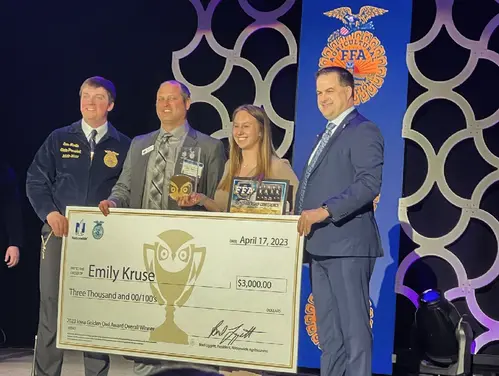North Scott educator Emily Kruse was crowned as the 2022-23 Golden Owl Award winner on Tuesday, recognizing her as Iowa’s outstanding agriculture educator for the year.
Sponsored by the Iowa FFA Foundation, Nationwide Insurance and other agricultural partners, this annual award recognizes excellence in teaching and promotes the importance of agriculture education in Iowa. Kruse was one of seven finalists for the award and was named as this year’s winner during the 95th Iowa FFA Leadership Conference in Ames. Through the award, Kruse will receive a $3,000 grand prize and the coveted Golden Owl trophy.
Kruse is a new teacher in the field, bringing fresh ideas and excitement to her agriculture classes for grades 9-12 at North Scott High School. She has been with the district since 2022 and also serves as their FFA chapter adviser. Staff from the Iowa Department of Education caught up with Kruse after the award announcement to capture her excitement and thoughts on agriculture education in Iowa.
Congratulations on being named this year’s Golden Owl Award winner! How does it feel to be named Iowa’s agriculture educator of the year?
It’s obviously such an honor. The other nominated educators have a huge legacy and impact in their schools and communities, and they are all leaders who deserve this award as much as I do. It’s a privilege to be recognized in this way and to see how excited my students were during the announcement. Overall, it’s a wonderful feeling – to have support from the local community, ag community and my home community at North Scott.
Why is agriculture education important for Iowa students? How does it help strengthen our future workforce?
I’m a firm believer in the connection between the education that teaches individuals the skills needed to be successful in careers and as consumers, and the importance of the agricultural industry that provides food on our plates, clothes for our back and fuel for our cars. Without ag education, it’s not going to be possible to have enough people to supply that food, fiber and fuel.
As ag educators, we focus on areas of career and technical education (CTE), which includes agriculture and business. We work in different project areas to support career exploration and the development of soft skills and technical skills.
As an FFA adviser, why do you think students should get involved in career and technical student organizations like FFA? What skills can it enhance?
FFA provides the additional foundation for students to form skills. In the classroom, we learn a lot of content. In FFA, we learn how to apply that content to real-life applications, such as ag sales and products. Students can learn sales principles like making small talk, pricing and every day job duties. It’s a chance for students in career and technical student organizations (CTSO) like FFA to further hone those skills and exhibit their content knowledge. They get to compete in contests through FFA, show what they know and be their most exemplary selves.
What opportunities do you see in the next few years in agriculture education?
The ag industry is constantly evolving, so ag education must also evolve. Delving into sustainability of how to meet the challenges of our populations and how we can continue to innovate will be on the forefront. Ag education that emphasizes all learners, no matter their backgrounds, will be important. We are really looking for opportunities to help them find their talents and apply them to agricultural contexts.
What do you think is the most rewarding part of being an agriculture educator? Why should a teacher consider going into agriculture education and what advice would you share with them?
For me, the most rewarding experiences are seeing students turn from apathy to excitement and engagement. Engagement comes from being able to facilitate their interests and giving them a place to apply them. It can be anything they are interested in from computer science to sales to environmental sustainability. It’s all about informing our students and having informed consumers in the end. I get to see students truly invested in themselves and their futures when we can turn their apathy into engagement.
Share a best practice you’ve learned as an ag educator.
As a teacher in general, building relationships with your students is the most important. When students feel like they are cared for and you’re invested in their success, that’s a solid foundation to work from. Building that relationship comes before any content learning, supervised agricultural experience, project or skills competition.
Any other thoughts?
I’m truly in awe. I am a newer teacher, so I’m definitely in awe of the other multi-year teachers out there. I think this shows, though, that there is an investment in our young ag teachers. There is a shortage of young educators in agriculture, so this is affirming that there is support for this work.
Subscribe to receive email updates from the Iowa Department of Education.
